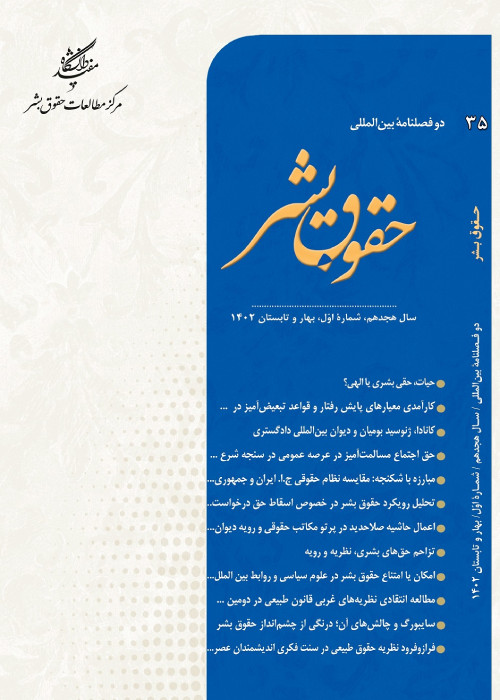فهرست مطالب
نشریه حقوق بشر
پیاپی 11 (بهار و تابستان 1390)
- تاریخ انتشار: 1390/06/13
- تعداد عناوین: 5
-
Page 3In the area of bioethics, human dignity is as a basic value, being necessary for human being beside his life and continuousness of his life. As the issue is a basic value ethically, law will be agent to protect it and takes some actions in support of that. Thus, as human dignity appears as “a basic value ethically” in the field of bioethics it also comes into view as “a basic right legally” in the field of law. The article with emphasis on human dignity, along with defining human dignity, deals with the issue in the frames of ethical value and right, and attempts to describe the varieties of human dignity and its exact definition in the sphere of bioethics. Finally, protective approaches will be described on the base of human international rights law.Keywords: Human Dignity, Bioethics, Human Rights, International Human Rights Law, Ethical Principles
-
Page 19Human rights in the present world is explained and justified on the basis of humanism. This kind of explanation is based less on natural rights. However, some philosophers and thinkers are searching for Divine and natural sources for human rights. This paper tries to explain one of the traditional theories of the modern philosopher, Leibniz. He tries to show that any right arises from natural rights and this is only possible in the moral life. But the only criterion that can cover both rights and ethics is justice. Justice is a virtue that is superior to other virtues. This kind of justice arises from natural rights which are in turn Devine things. Human rights is measured by this criterion and punishments are imposed and rewards are given by this kind of justice.Keywords: Rights, Natural Rights, Justice, Punishment, Ethics, Good
-
Page 31Two revolutions in our time i.e. the end of the Cold War and the communication revolution in the 1990s were among the major factors that undermined the principles of states’ sovereignty and non-intervention in the affairs of independent states which were the raison d’être of modern states in the previous centuries. These revolutions have opened the internal affairs of states to the outside world and transmitted the voices of different groups to outside. As a result, the universal attention to human rights issues have increased and states have become more susceptible to and responsible for observing those rights. Increased universal awareness about human rights issues has contributed to change of paradigm of the states’ main function from ‘government’ to ‘governance’ in which the responsibility of the government extended to include the responsibilities of the business community and the civil society. ‘Good governance’ is more idealistic form of governance that administers public affairs and resources with utmost transparency and attention to different dimensions of human rights, as civil, cultural, economic, political and social rights.Keywords: Cold War, Communication Revolution, Traditional Pattern of Ruling (Government), Governance, Good Governance, Human Rights
-
Page 45“Human rights” is one of the most important achievements of western civilization which could affect the internal law of many countries. In spite of the fact that some states have used human rights as a means of furthering their own interests undermining its ethical function, these rights have been formulated to respect “human dignity”. This paper tries to answer two questions: what is the relationship between intellectuals and the idea of human rights? And the second and main question is that in the second Pahlavi era what were the religious intellectual explanations of human rights? The answer to the first question is that intellectuals were among the most significant social forces who were always concerned with implementing human rights. The answer to the second is that in the second Pahlavi era, religious intellectuals were trying to draw the concepts of human rights from the traditional sources, develop and employ them against the reign of Pahlavi.Keywords: Human Rights, Intellectuals, Ethical Concepts, Second Pahlavi Era
-
Page 61The right to Social Security is one of the rights which appears in two important instruments of human rights—that is, the Universal Declaration of Human Rights and the Covenant on Economic, Social and Cultural Rights. The devotion of a separate article to right of Social Security in these two universal instruments indicates that this right is essential in the views the framers of the Declaration as well as international convention. Despite the emphasis put by the Declaration on international cooperation for implementing this right, unfortunately the appropriate action has not been taken yet in international scale. The low tendency to Social Security must be related to the economic problems surrounding this right. The low tendency to Social Security can also be seen in the regional instruments of human rights. These instruments have not mentioned the term “social security” independently; just there are general indications in some famous conventions of International Labor Origination (ILO). Of course in some special protocols prepared on specific issues by regional originations, Social Security has been discussed which is not convincing at all. If regional originations had been serious about implementation of Social Security as a human right, they should have referred to it in the original and mother text.Keywords: Human Rights, Right of Social Security, Human Rights Instrument (Universal, Regional), International Labor organization (ILO)


